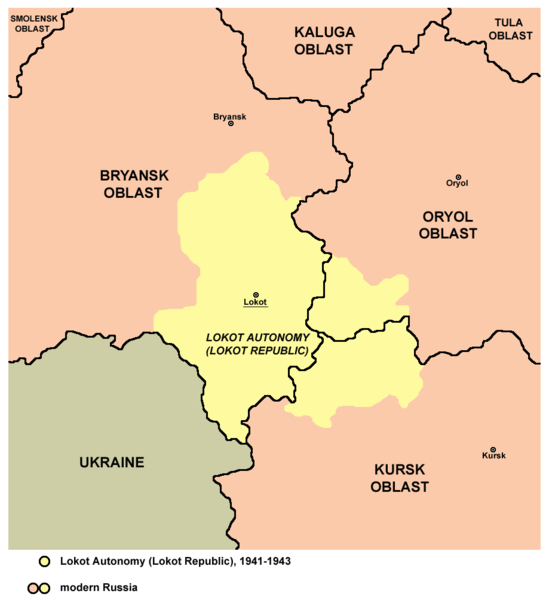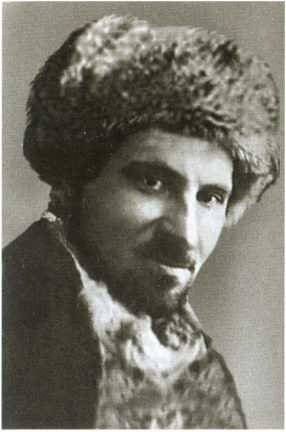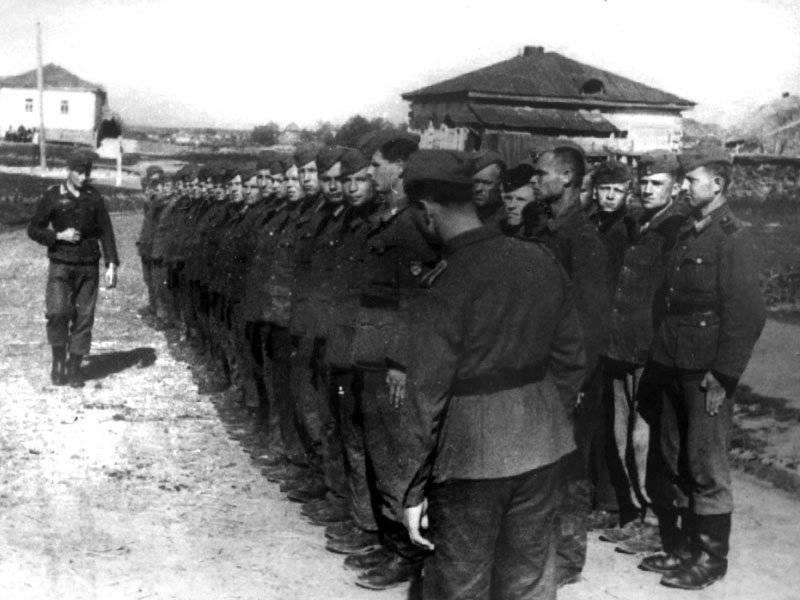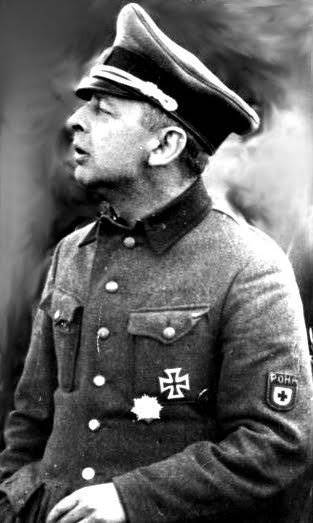Ambiguous pages of the Great Patriotic. Lokot republic: a paradise for patriots or opportunists?
So, Lokot republic or, otherwise, Lokot self-government. What is it, and why is this topic itself and, even more so, its discussion in our country has been banned for a long time?

The Lokot Republic itself begins its history, judging by the documentary evidence that has survived to this day, a few weeks before the German occupation forces entered the territory of these places (then the territory of the Oryol region, and now the territory of the Bryansk, Oryol and Kursk regions). By the will of fate, the administrative center of self-government was the small town of Lokot, which had the status of a village before the arrival of German troops. Why exactly the Elbow? Many historians give the following explanations to this question. Elbow and surroundings since the establishment of Soviet power in Russia (the USSR) were considered, so to speak, not the most loyal territories of the same Soviet power. In these places there was a fairly large percentage of people who called themselves offended by the Soviet regime, which supposedly gave rise to the start of anti-Soviet political and military construction in Lokta (local residents are used to declining the name) and in the surrounding lands.
It was these "offended" and took such a man as Konstantin Voskoboynik, who settled in the town of Lokot for 3 year before the start of World War II, under his wing. Voskoboynik himself, if we proceed from his officially published biography, during the pre-war 22, he managed to “distinguish himself” in various fields. During the Civil War in Russia, he was an ordinary fighter of the Red Army, was wounded, demobilized, after which he found himself in the secretarial office of one of the district military commissariats. Being in this position, 24-year-old Konstantin Voskoboinik (born in Kiev province) suddenly decided to take a direct part in the uprising against Soviet power, joining the ranks of the continuing party of Social Revolutionaries. The further fate of Voskoboynyk is more than foggy.
 On the one hand, it is quite possible to adopt the idea that it was the “offended by the Soviet authorities” citizens who became the “bricks” that later formed the whole republic in the territory occupied by the Germans and even with unthinkable powers for the occupied lands of the local authorities. But on the other hand, we can say that, to put it mildly, they were offended by the Soviet power not only in Lokt. Far from it, Lokot went through all the difficult stages of the formation of the Soviet state with military communism, tax in advance, dispossession of kulaks and other "charms" that awaited the peasantry. So why in the vast majority of other USSR territories (in particular, Russia) occupied by German troops, they did not prepare so enthusiastically for a meeting of the invading army, and in Lokto they were preparing? So zealously prepared under the leadership of the same comrade Voskoboinik, rushing from one idea to another, that even before the Germans arrived in Lokto, the institute of self-government and the self-defense detachment were formed, and the detachment's activity was aimed at pinpoint strikes against the Red Army units that were in the most difficult situation. The "valor" of the detachment was approximately the following: to finish off the wounded Red Army soldiers, collect data on the emerging centers of resistance and prepare them for transfer to the German troops.
On the one hand, it is quite possible to adopt the idea that it was the “offended by the Soviet authorities” citizens who became the “bricks” that later formed the whole republic in the territory occupied by the Germans and even with unthinkable powers for the occupied lands of the local authorities. But on the other hand, we can say that, to put it mildly, they were offended by the Soviet power not only in Lokt. Far from it, Lokot went through all the difficult stages of the formation of the Soviet state with military communism, tax in advance, dispossession of kulaks and other "charms" that awaited the peasantry. So why in the vast majority of other USSR territories (in particular, Russia) occupied by German troops, they did not prepare so enthusiastically for a meeting of the invading army, and in Lokto they were preparing? So zealously prepared under the leadership of the same comrade Voskoboinik, rushing from one idea to another, that even before the Germans arrived in Lokto, the institute of self-government and the self-defense detachment were formed, and the detachment's activity was aimed at pinpoint strikes against the Red Army units that were in the most difficult situation. The "valor" of the detachment was approximately the following: to finish off the wounded Red Army soldiers, collect data on the emerging centers of resistance and prepare them for transfer to the German troops. The message of Voskoboynik himself was obviously the following: the Germans would come and see how we fought the “councils”, and this would enable us to enlist the support of the occupying forces. And this message, as history shows, has worked. The German command, seeing that there are formations loyal to the Reich in the occupied territory, decided to use these formations for its own purposes - to continue the formation of the artificial Lokot Republic with the simultaneous vesting of Voskoboinik with the authority of its burgomaster. There was such an interesting situation, in which Voskoboinik and his art of controlling the masses were very necessary for the Germans, who experienced great problems in the localities in connection with partisan attacks, and the Germans themselves were needed by Voskoboynik to go to their goal. What was this goal - the main historical question in relation to the entire Lokot Republic.
On this account, some historians, using some parallels with anti-Soviet activists in Western Ukraine, say that Voskoboynik and his associates, they say, cannot be considered accomplices of the Nazis, as they (Voskoboinik’s companions) only used the German occupation to develop a new Russian state under the guise of this very occupation. They say that Voskoboynik could not even begin to fight with the German units — then his whole idea of creating an independent Russian state would have come to an end. But in this regard, the question is: when did Voskoboinik suddenly have an idea to build such a state? Is it not at that moment when he visited the OGPU building in Moscow with a confession? .. And why, if Voskoboynik bore such an idea, then his political views changed with amazing regularity: from adherence to the ideas of Bolshevism to “Socialist” moods, from “Socialist” moods to “ of repentance "before the Chekists, from the" repentance "of the OGPU to the decision to cooperate with the occupying forces of the Reich ...
Proceeding from such changeability in the moods and political views of a citizen of Voskoboinik, the following person’s credo emerges: cooperate with the one who is stronger at the moment. The Soviet power showed its strength - Voskoboynik kept his “offense” to it so deeply that no one knew that this citizen was “offended”, and Voskoboinik himself worked well for this power; Soviet power began to be squeezed out by German troops - he quickly realized that it was necessary to switch to the side of the new force. In simple terms, this policy is called the policy of adaptation, which in the so-called Lokot republic was perfected.
Obviously, the Germans also knew perfectly well who they were dealing with, but they clearly dismissed these black thoughts for them, hoping that the Vokboinik’s Lokot formation was their reliable support in the region. Voskoboynik and his associates skillfully played along ... Admittedly, they played along with a hunt ...
For quite a short time, the so-called Russian People’s Liberation Army (RONA, not to be confused with the Vlasov ROA) was formed from self-defense forces in Lokt and its environs. It was RONA, whose number in 1943 reached 20 thousands of people, and was of primary interest to the German side, since the Nazi occupying forces were able to fight the Soviet partisan resistance in Bryansk and Orlovschiny by local residents. It was precisely the forces of RONA that carried out punitive operations against partisan groups and the population loyal to partisans. RONA's actions were fully encouraged by the German side, which often resulted in unprecedented situations in the territory of Lokot self-government.

One of these situations is confirmed by historical documents. They contain a remarkable fact when two local German soldiers were sentenced to death by a local county court who took part in looting actions in one of the villages of the “republic”. The occupation forces were indignant with the verdict, but from above they were instructed not to hinder the administration of justice by the local population. This increased the authority of local authorities and at the same time showed how great the German interest was in anti-partisan actions of RONA, as well as how, let's say, flexible were the provisions on the races of "superhumans" and "subhumans" developed in the depths of the Third Reich.
The Germans themselves by all means nursed the Lokot Republic and tried not to interfere in self-government, for the simple reason that it was important to have, let's say, a positive pattern of occupation in their ideological work. Like, let them see in the USSR and the rest of the world that German forces support the formation of democratic institutions in the “liberated from the Red Army” territories of the Union. This propaganda move was bearing fruit for some time: some partisan detachments, losing contact with the center, almost completely switched over to RONA, which is reflected in historical documents that were publicized only recently.
Today, these facts are trying to use the so-called hyperliberal forces, declaring that if the German army had not resisted throughout the USSR, Russia would have turned into a prosperous democratic state immediately after the blitzkrieg. And so, they say, they themselves are to blame for the millions of deaths ...
Such, if I may say so, ideas do not hold water. Indeed, one thing is to have a small territorial entity similar to the Lokotsky volost, loyal to the Nazi regime, which existed in the form of a propaganda signboard of Reich actions on the Eastern front (then in the German rear), and it is quite another thing to take into account the theses of the ideologists of fascism and Nazism that Russia is the state, along with most of its peoples, was supposed to cease to exist. I wonder what Voskoboinik and his replacement at the post of chief burgomaster, Bronislaw Kaminsky, thought about this? Most likely, they simply drove away these thoughts from themselves, hoping that their “grateful” German authorities would retain as the main “prophets” of the formation of the new Russian statehood.
 In order to preserve, the Lokot leaders (first Voskoboinik and then Kaminsky) decided to extrapolate the ideology of the Third Reich to the territory they controlled. It is worth paying attention - themselves, without the stubborn planting of this ideology by the occupation authorities. They showed, so to speak, a “reasonable initiative” (this is on the issue of the independence of the Lokot Republic). Extrapolation required the creation of an entire political party, the main ideological motivation for the existence of which, in addition to new slogans such as “land to peasants”, was the following theses: “the destruction of accomplices of the communist system”, “the destruction of Jews”, “the destruction of former political department employees in the Red Army”. It is noteworthy that according to these theses, Voskoboinik himself was to be the first to fall under the hot hand of the new government. After all, as already mentioned, he worked in his own office at the secretariat of the Red Army Military Commissariat, went to pay homage to the workers of the OGPU, and there were, and still are, questions about his ethnicity.
In order to preserve, the Lokot leaders (first Voskoboinik and then Kaminsky) decided to extrapolate the ideology of the Third Reich to the territory they controlled. It is worth paying attention - themselves, without the stubborn planting of this ideology by the occupation authorities. They showed, so to speak, a “reasonable initiative” (this is on the issue of the independence of the Lokot Republic). Extrapolation required the creation of an entire political party, the main ideological motivation for the existence of which, in addition to new slogans such as “land to peasants”, was the following theses: “the destruction of accomplices of the communist system”, “the destruction of Jews”, “the destruction of former political department employees in the Red Army”. It is noteworthy that according to these theses, Voskoboinik himself was to be the first to fall under the hot hand of the new government. After all, as already mentioned, he worked in his own office at the secretariat of the Red Army Military Commissariat, went to pay homage to the workers of the OGPU, and there were, and still are, questions about his ethnicity.However, for obvious reasons, Voskoboinik himself did not fall victim to the party program, but these victims were about 250 Jews of the Lokot volost, who were shot by the local police, and more than two thousand Russians (under Voskoboinik) who somehow supported the partisan movement. Many of them were burned alive in their own homes. The brutality of the massacre was noted in the reports of the German command to Berlin, which was the reason for the further expansion of the powers of the authorities of the Lokot Republic. This once again shows the true motives of Voskoboinik, Kaminsky and their main comrades.
But how much string does not curl ... The Voskoboinik was destroyed first. He was killed by partisans in January 1942. All powers passed to his successor, Bronislaw Kaminsky, as is now fashionable to say. The Lokot Republic finally turned into a police state, on whose territory only one idea could be preached - the idea of complicity to the Reich and settling accounts with opponents of the Reich. The archives preserved reports of Kaminsky himself, which reveal the scale of punitive and "preemptive" operations - operations to "tune" the local population to greater loyalty to the occupation forces.
Reports indicate that during only one of these operations, local police used up to 100 heads of cattle from residents of several villages, several wagons carrying hay, clothes, food. 40 people were shot with the wording: "for aiding partisan detachments" without trial. At the same time, the local residents themselves say that the phrase “for aiding the partisans” was used by Kaminsky whenever his police and army required food. If people tried to protect their property - they were simply destroyed physically ... In total, during the existence of the Lokotsky self-government, more than 30 thousands of local people were hijacked to work in Germany, about 12000 people were executed, completely looted and burned 8 villages. This indicates the real work of the Lokot judicial system of that time, more precisely, that this system was nothing more than a signboard for convenient propaganda by the occupying forces.
When detachments of the Red Army began to approach the Lokot Republic in 1943, what usually happened with groups of opportunists - many quickly realized that it was time to tie up with games in the Kaminsky republic and go over to the side of the attackers. The fighters of the Lokot Republic, who destroyed the partisan underground yesterday, began to surrender to the same partisans along with weapons carts. Kaminsky himself, with the units of the RONA remaining at his disposal and several thousand representatives of the loyal population, was transferred from Lokot volost to the rear of the German army - to Belarus (Lepel market town), where the Lokot republic experienced reincarnation and turned into the Lepel republic. Local residents say that the so-called "populists" of Kaminsky did not behave any more humane, and sometimes much more cruelly, than the German invaders.
The Germans continued to use the Kaminsky detachments to carry out punitive operations, and Kaminsky himself (by that time, the holder of several Reich awards) made the title of waffen brigadefürrer SS, which corresponds to the domestic version of the rank of major general. RONA participated in the suppression of the Slovak uprising, the Warsaw uprising, the "cleansing" of the partisan regions of Belarus.
The Kaminsky days were numbered in August 1944, when the Germans suddenly received information that Kaminsky in 1940 was recruited by the Shadrinsk NKVD while working in one of the technological teams. It’s not quite appropriate to use the word “recruited” here, because working in so-called “sharashkas” at that time itself meant certain agreements with security officers, but ... And Kaminsky worked in Sharashka at one time. The Germans, having received such information about Kaminsky, quickly forgot about his personal merits for the Third Reich, and staged an attack on Bronislav Kaminsky of the Polish partisan detachment. In fact, Kaminsky was shot in Varteland (Western Poland) as an agent of the Soviet special services, but the RONA fighters were informed of the attack on their Polish commander, which led to even more bitterness towards the Polish population.
With the death of Kaminsky, the history of the Lokot Republic ended, which “moved” from place to place, trying to get shelter in the Reich from the advancing Red Army. Most of the RONA fighters dissolved in Germany, and, importantly, managed to escape retribution. There is evidence that several hundred “elbow-populists” returned to the territory of the USSR, but under the guise of liberated prisoners of concentration camps and civilians hijacked to work in Germany. The post-war turmoil could not reveal all those who, calling themselves the builders of the Russian state, took part in the executions of civilians, aided the occupying forces and opposed the Red Army.
Was the Lokot Republic a republic in the full sense of the word, and were democratic ideas cultivated in it, as some researchers of history are trying to present? Certainly not. This territorial entity was nothing more than an example of the administration of the policy of adaptation, which was chosen by several rather active residents of the region as their main life idea. The mere fact that the ideas of Voskoboynyk and Kaminsky found support only in a relatively small occupied space indicates the strangeness of these ideas to the bulk of Soviet citizens who fell under the authority of German troops. At the same time, all the “good” ideas of the Lokot leaders on the development of agriculture and industry, building the judicial, educational and other systems - there is a banal screen of real goals - saving their fifth points. And all this external goodness is crossed out by shot, burned and crippled people who did not want to be led by the opportunists and collaborators.
Information